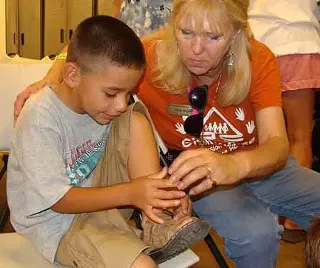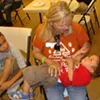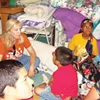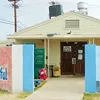On a Thursday at 4:30 p.m., a vacant lot off 22nd Street between Columbus Boulevard and Swan Road is teeming with people, even though dark monsoon clouds are creeping closer from the southeast side of town. The lot will soon be covered in rain, but for now, people remain in line for a dinner dished out on paper plates; later, they can pick up canned foods and clothes, plus treats for kids, as offered every Thursday and Sunday evening.
This is a place where you'd think kids would be sticking to their parents' sides or hiding behind a mother's leg. Instead, most of them are huddled together—and singing—near the entrance of the lot, surrounding a woman wearing a wide-brimmed sun hat.
Libby Wright is exactly the person they want to be near, the person they want to hug and touch.
A few mothers stand outside the periphery of this circle with their toddlers, but even those youngsters eventually leave the security of their mothers, walking gingerly toward the middle, holding their bottles with one hand and searching out Wright with the other.
Despite the smiles and singing, these are difficult times for Wright and the organization she founded more than 15 years ago to help children and the homeless.
From her perspective, The Giving Tree is under attack. When Wright sits down to talk about who or what is behind the attacks against the nonprofit organization she works for as a volunteer director, a list of other nonprofit organizations and state agencies roll off her tongue—but lately, she's blaming more of the attacks on the city of Tucson.
The organization's Compassionate Hope Center—a building north of 22nd Street off Swan Road that's part church, part shelter, part homeless kitchen—recently received notice from the city's Code Enforcement Division that the organization is in violation and could permanently lose its occupancy certification.
In April, representatives from the city arrived at the center with Tucson Police Department officers in the middle of the night, according to Wright. The Giving Tree was given a notice that it was in violation of specific city codes, and told it couldn't continue to operate a shelter until a decision was made by the city's board of appeals.
Code officers noted that the building was being used as an overnight shelter and housing more than 50 people inside, while others were found sleeping outside, in the yard, on the porch or in sheds. According to the city notice, some of those sleeping inside were blocking exits, creating a fire hazard. The city notice points out that the building's maximum occupancy load of 108 was given when the organization opened the center as a church, not as a shelter.
Wright has a different perspective. She explains that The Giving Tree is a nondenominational faith-based organization, and that the Compassionate Hope Center serves as its church. Wright points out that during the winter, other churches and faith-based organizations open their doors to offer shelter on cold winter nights for a project called Project Hospitality. The program receives local, state and federal funds—but The Giving Tree does not participate.
Wright says the winter project was something homeless activists had to fight the city to do—and Wright adds that she's all about doing things her own way, which is not necessarily the way other organizations think she should operate. That's why she offers shelter at the center year-round.
"Just look at the book of Acts in the Bible. It tells you what you're supposed to be doing as a church: Feed the hungry; cloth the naked; and house the homeless and the widows, or I should say widowers nowadays," Wright says.
From the small office at the Compassionate Hope Center, Wright can see a room full of familiar faces. Most live in one of the four houses that serve as transitional housing shelters owned by The Giving Tree in a neighborhood south of 22nd Street. They are there on Tuesday for a mandatory Christian-themed discussion on living a purposeful life.
"What am I supposed to do? Most people who show up here are without a place to stay. They come and knock on our door. We can't turn them away," Wright says.
From the other side of the window, two young boys peer through the glass to catch Wright's attention. Once Wright leaves the office, those same two boys wrap their arms around her. Some of the adults try to talk to Libby or share a problem; she tells a few of them to call the office in the morning.
But for the kids, she sits down—she pays attention.
It's a gift given by God, Wright explains.
Children have always loved her, and children are the reason she got into this field. Wright says she was born in Greenland, and left in 1972 to start a new life in the United States. She has two grown sons; one is a firefighter, and the other is in the U.S. Navy. When her first son was an infant, Wright says, she was working full-time, but she found herself in financial trouble. The two lived in her car in Los Angeles until they got back on their feet.
During her days in L.A., she says, she met her husband, who owned a high-end Beverly Hills hair salon called Tease. When he sold his business, and they sold their home, they bought an RV, packed up the kids and spent a lot of time traveling around the country before settling in Tucson.
One day, a little boy showed up at her door and asked her if he could borrow a peanut butter and jelly sandwich.
"He was being raised by his grandmother. She was trying to raise eight grandkids. After we fed him, he came back with his cousins, brothers and sisters in tow, because they were hungry, too," Wright recalls.
"(The grandmother) couldn't keep up, didn't have food, and she just needed some help. I figured some people might have called (Child Protective Services), but I didn't."
Today, she says, it isn't unusual for her phone to ring nonstop on Mother's Day and Christmas.
"People say to me there's something that kids see in me. I know what it is. I love kids, and kids can see that. I think that's because I am called by God to do this. I think the children who've been brought to our homes understand that I love them, too."
During a tour of the four homes The Giving Tree uses for transitional housing in the Myers neighborhood east of Swan Road and south of 22nd Street, the kids are ecstatic to see Wright. Each house looks like a typical family home—toys are on the floor as children are playing; TVs are on as kids take naps or parents read in the bedrooms (each with two or three sets of bunk beds); some people are making snacks in the kitchen.
While walking between houses, Wright says that each person who arrives goes through a background check and an intake procedure. Most, Wright says, are women leaving a domestic-violence situation; others are single fathers or mothers, working to keep their family together after the death of a spouse. Wright says she's even been contacted by law enforcement to house people in witness protection.
When Wright is asked how the neighbors feel about the homes and the Compassionate Hope Center, she says there have never been any complaints.
Everyone gets along with The Giving Tree, she says.
Shortly after Wright tells the Tucson Weekly that The Giving Tree's facilities are well-liked by their neighbors, the Arizona Daily Star publishes a series of three stories about the city issuing the aforementioned notice of violation.
In one of the stories, the president of the neighborhood association where the Compassionate Hope Center sits is quoted as complaining about the center, saying the neighbors have had problems with the organization since the center opened in 2005.
Wright told the Weekly the neighbors have been pleased, because The Giving Tree took a boarded-up building and fixed it up. They've also followed all other city code requirements—a sprinkler system goes throughout the 2,200-square-foot building, and a fire-suppression system was installed in the commercial kitchen.
When Robert Bowers, president of the Toumey Park Neighborhood Association, talks to the Weekly about the Compassionate Hope Center, he says neighbors complained to the city for more than a year before officials finally appeared on the scene to inspect the center at 4 a.m. one April morning. He wonders what took the city so long.
"When it first opened in 2005, it didn't take long for the neighborhood to realize The Giving Tree misrepresented itself (as just a church)," Bowers says.
In 2006, it became obvious the building was a homeless shelter, Bowers says. Between 2007 and 2008, neighbors saw crime activity increase 52 percent within a one-block radius of the center.
In May 2007, Bowers called the city and asked them to look at possible code violations. The building is zoned as residential, and because it's a church, it is allowed to have an occupancy of 108 for church activities. If it is a shelter, Bowers says, The Giving Tree needs a license and a different zoning code.
"All we were asking is that the city apply its own laws and look at the center a little more closely," Bowers says.
Finally, the city did—and Development Services director Ernie Duarte denied The Giving Tree's appeal. The case will now go before the city's board of appeals on Friday, Aug. 14, at 2 p.m. in Public Works, 201 N. Stone Ave., in Conference Room C.
Vickie Mesimer has heard people in her neighborhood complain about The Giving Tree, but she decided to be a friend rather than an angry neighbor.
Mesimer is a former president of the Myers Neighborhood Association and lives just down the street from The Giving Tree's four transitional-housing homes. Mesimer is also the current chair of the 29th Street Coalition, a group of five neighborhoods that have worked together for five years to successfully decrease violent crime by 54 percent.
"I've known (Libby Wright) for five years, and I absolutely love what she's trying to do, but it seems to me she has her hands full, and the number of people who are homeless in Tucson seems to be growing," Mesimer says.
Mesimer says that Wright seems to have trouble saying no, as evidenced by the large number of people staying in each of The Giving Tree homes in her neighborhood.
The neighbors get upset and call Mesimer with their complaints—about The Giving Tree residents leaving cigarette butts on the sidewalks, or a spike in thefts, or perhaps too many people loitering in the area.
"I know in the past, she had strict rules when she first started out, but she also recruits from within. The house parents are former clients, and I just don't think she really knows everything that's always going on, as she has in the past. But I want you to know I support her; I just think it's gotten too big for her," Mesimer says.
Mesimer says she feels stuck in the middle, because she easily sees both sides. She worked with Wright to get The Giving Tree's residents more involved in the neighborhood. Last year, they came out to help neighbors finish work on a park.
When neighbors do complain, Mesimer tells them to work it out.
"If they are upset by the cigarette butts, go get an ashtray for them. Maybe that's what they need," she says. "I've worked to keep the lines of communication open, but it's hard to explain that to other neighbors, especially when our home values are going down as it is, and many are worried this could affect our property values even more."
The Tucson Weekly heard from several nonprofit-agency staff members and executive directors who've had great difficulty working with Wright, but almost no one wanted to go on the record.
However, Jill Rich, a longtime volunteer with many organizations in town including Jewish Refugee Resettlement of Southern Arizona, agreed to comment. Rich says past dealings with The Giving Tree have made her feel something is not right about the organization.
Rich says The Giving Tree claims it has a refugee program, which she thinks is misleading. There are only a handful of selected organizations that offer refugee programming, from housing to job counseling to case management. Federal funds go to these agencies—and The Giving Tree is not recognized as a refugee organization, Rich says.
But what really put Rich off is the fact that her agency once needed a place for a refugee family to stay temporarily, and Wright told Rich she'd take the family.
"But we'd have to pay to get them in," Rich says she was told. "We made other arrangements for them."
Brian Flagg is director of Casa Maria, a feeding program that relies heavily on volunteers. Flagg says he's always had a different perspective—one that may not be popular with other nonprofit directors.
"I tend to like The Giving Tree, although I'm not totally (coming) from an informed position. I've only met Libby once, but they seem to be a grassroots group that's really into serving the people," Flagg says.
Dollars are a big issue right now in the nonprofit community, especially those serving the hungry and the homeless. Flagg says there are a lot of turf wars between organizations, and perhaps that's where some of the ill will toward Wright comes from; after all, Wright is known as someone who breaks the rules and runs her organization the way she sees fit.
"If people are mad at her because she's breaking a bunch of rules, well, that's probably a good thing," Flagg says.
However, Rich says The Giving Tree has a reputation for not doing proper case management with their clients, and that Wright has a tendency to get angry at other agencies doing the same work.
The winter-housing program, for example, came under attack by Wright when code enforcement first inspected the Compassionate Hope Center and questioned her using the space as a shelter.
"She got nasty and complained about other churches. It's a vicious approach. That's just not the way the game is played. In addition, none of their clients are case-managed, and the nice thing about case management is that it leads to a positive outcome," Rich says.
"I believe in grassroots activism. I'm the first one to be a believer in grassroots movements, but it has to be done with some accountability. You just can't have a lot of people staying in one place, men and women and children together. It has to be safe."
When Wright looks at the notice of violation from the city, she shakes her head as she points out that officials found a man sleeping in a shed in the yard.
"That was probably Bruce," Wright says.
The Giving Tree has a restraining order against Bruce; Wright describes him as an unstable man who was eventually asked to leave the center.
"I'm sure he's the person who called to complain to the city about us," Wright says.
If he did, Bruce isn't the only person who has complained to the city. Tara Drew, a 30-year-old mother of two children, says she recently wrote a sworn statement for the City Attorney's Office regarding her experience as a client of The Giving Tree.
Drew says the statement was requested as part of a city investigation. (City Attorney Mike Rankin did not return calls asking for comment.)
Drew says she worked for 17 years, but she lost her job and became depressed, which led to her becoming homeless—and she turned to The Giving Tree.
In early November, Drew says, someone told her about the organization. She went to the Compassionate Hope Center with her two children and lived there for several days, until, she says, she realized it wasn't the best environment for her children. She asked about other options, and the person in charge told her about Grace Home, one of the four transitional homes The Giving Tree operates.
Drew says she left the home in early April, after a series of events that she describes as "just not right." One issue: She was waiting for a $1,500 income-tax return. Drew says the organization screens everyone's mail and looks for government-issued checks, and clients are required to open the check envelopes in the presence of Giving Tree staffers. Drew says that when her check arrived, the house parent called Wright, who then told Drew to go to her bank to cash the check.
"I was told I had to give The Giving Tree $600 by 10 a.m. the next morning, or I would have to leave," Drew says.
She gave the money, and on March 5, she gave $600 more. Drew says that when she couldn't afford to give more, she was asked to leave. During her stay, she says, she felt threatened, and at one time was held in the house parent's room until she agreed to give The Giving Tree $600.
After leaving, Drew went to the Salvation Army for help. The intake was formal, rather than verbal, as it was when she first arrived at the Compassionate Hope Center. Through the Salvation Army, Drew says, she and her two children were set up in a motel room, and she was enrolled in an employment program through Pima County.
"Now I'm in a duplex on my own, and I'm working 40 hours a week in a job," Drew says. "That never seemed a possibility when I was at The Giving Tree."
The Giving Tree's board president, Dick Mentzer, says he's always thought that the charges to clients—from the $300 a month requested for those living in transitional housing, to the $8.50 charged for a place to sleep and a shower at the Compassionate Hope Center—were program fees.
"(Wright) pretty much calls the shots there; she put this all together," Mentzer says when asked how the board will respond to the allegations made by Drew and the city of Tucson. "She would do anything for these people. Probably we pushed the envelope a little by having so many people in there. But Libby's always said it's far safer inside in the building like this, where they have people around them, rather than outside."
Mentzer says the board is more like an advisory board that has no control over its executive director.
"When you see all the good coming from what we do, it seems that it works for the good, but maybe the problem is we're trying to do too much too soon," he says.











